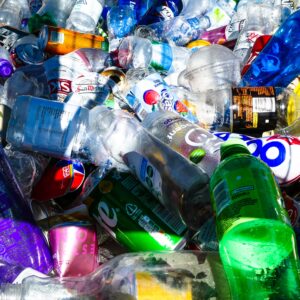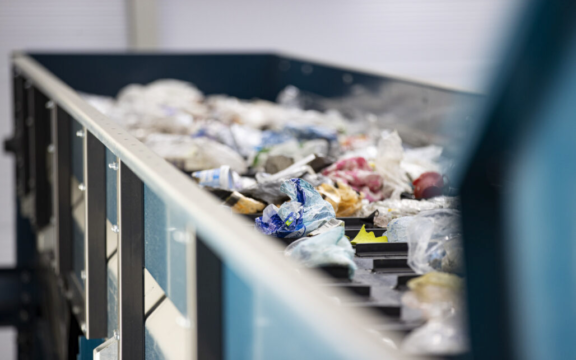We live in a plastic age. Our society thrives thanks to developments in polymer science and technology. However, unlike other materials, plastic does not biodegrade. It can take up to 1,000 years to break down, accumulating in the environment, finally leading to a crisis point. Yet, plastic is far too valuable to be treated as waste. At ISPT, our ultimate goal is a future in which we have moved from a linear system to a closed circle. In this circular plastics model, plastics are made from recycled materials, and CO2 emissions are drastically reduced.
Circularity is the cornerstone of a sustainable future, particularly in the realm of plastics. In a circular economy, plastics are designed to be reused, remanufactured, and recycled, ensuring they remain in use for as long as possible. This approach maximizes their value and minimizes environmental impact. At the end of their service life, plastics are recovered and regenerated, transforming waste from one process into valuable resources for another. In establishing a future circular economy, the importance of circularity in the plastics industry—and the broader process industry—cannot be underestimated.
We have to get rid of plastic waste, without losing the societal benefits
Ronald, Korstanje, CPI In Shell Window
Circular plastics
Circular plastics offer a solution for reducing plastic waste, lowering CO2 emissions, and decreasing the reliance on fossil raw materials. According to the European Union, each person in the EU generated an average of 36.1 kilos of plastic packaging waste in 2021. From 2010 to 2021, the volume of plastic packaging waste per inhabitant increased by about 29% (+8.1 kilos per person). Currently, most plastics are not properly recycled. In 2019, world-wide, approximately 22 million tonnes of plastic ended up in soils, rivers, and oceans, and this plastic leakage is expected to double by 2060. To address this, we combine our expertise in life cycle analysis and life cycle costing with advanced recycling techniques.
Sources: European Parliament, OEC, Circular Plastics Initiative
Our vision
Our vision for 2050 is a world where almost all plastics are recycled and reused, forming an interdependent system where every link in the chain collaborates seamlessly. In this ideal state, there is no more plastic litter or need for landfills. We bring together scientific groups from top universities and leading companies from relevant industries to work on subjects of mutual interest.
The main aim? To pioneer groundbreaking innovation in polymer science and create sustainable solutions for long-term challenges. This vision is guided by our circular plastics roadmap, driving us towards a sustainable and waste-free future.
The circular plastics initiative
The Circular Plastics Initiative (CPI) acknowledges the benefits plastics have brought to our modern world, but also recognizes the significant environmental concerns, particularly plastic waste littering our planet. In response, the CPI is on a mission to promote the transition to circularity in plastics at an industrial scale. Our ultimate goal is a future in which we have moved from a linear system of production based on fossil feedstock to one based around a closed circle. In that circle, plastics are made from sustainable materials, and CO2 emissions are drastically reduced.
It is clear that, as a society, we need to rethink plastic. Our mission is to boost circularity in plastics on an industrial scale by addressing the entire value chain from an international perspective. We focus on the technological, logistical, and societal challenges ahead.
The CPI addresses the entire plastics value chain, tackling technological, logistical, and societal challenges with the ultimate goal of moving away from the current linear system based on fossil fuels. Instead, we aim to establish a closed circular system where plastics are made from recycled materials and CO2 emissions are reduced. All our projects are in close collaboration with DPI, the Eindhoven-based industry-driven international collaboration platform for pre-competitive research in the field of polymers
The Circular Plastics Roadmap
In 2021, the Circular Plastics Initiative released its Circular Plastics Roadmap. The roadmap was developed in collaboration with experts from industry and academia. Furthermore, The CPI frequently updates the roadmap based on recurring input by the involved partners. The Circular Plastics Roadmap isn’t just a timeline with milestones. It also sets out a vision for the future and shows how it can be realized. Our roadmap outlines necessary steps for a circular future. It is an interactive document that shows what steps will be needed to create a future where sustainability and circularity are prioritized.
Priorities in the Circular Plastics Roadmap
Priority 1 Design for recycling
Designing plastic products for recycling means ensuring they can be recycled repeatedly. This requires rethinking the chemistry between the polymer matrix and additives like colorants and stabilizers. After use, specific processes must be developed to recover these additives from the plastic matrix. Achieving this, demands innovative ideas and dedicated collaboration.
- Modelling and linking recyclate quality with design for various value chains
- Defining and eliminating the main interfering substances for various value chains through sorting and processing
- Developing design rules and processes to comply with new legislation for different value chains and applications
- Modelling multi-layer mono-polymer process design and functionality for various value chains and applications
- Ensuring stability of products and applications when multiple recycling loops are implemented
Priority 2 Chemical recycling
Chemical recycling refers to new technologies that transform plastic waste and organic residues into base chemicals, monomers, and feedstocks. It offers additional options alongside mechanical recycling, bridging waste management with the petrochemical industry.
- Creating a multipurpose platform for process monitoring
- Developing efficient separation techniques for clean recyclates
- Optimizing pre-treatment technologies for better efficiency
- Producing recycled materials suitable for multiple recycling loops
- Establishing depolymerization methods for composites
Priority 3 Sorting techniques
New sorting and characterization technologies must be developed to efficiently sort plastic waste for mechanical, chemical, and thermochemical recycling. The design of future plastic products will dictate these technologies. Therefore, detailed recycling design guidelines are crucial. They inform collection and sorting models, including effective grinding and washing methods, to assess various future scenarios. Realistic testing and technology development are necessary to validate these models and design sorting units that produce cost-effective feedstock streams for different recycling methods.
- Assessment of sorting techniques for different value chains
- Integrating new sorting and washing techniques into the Design for Circualrity (D4C
- Mechatronic sorting development using AI and machine learning
- Creating an expert system for predicting recyclate value across different value chains
- Studying microplastic formation during sorting and washing, and developing mitigation strategies
Priority 4 Mechanical recycling
Mechanical recycling is processing plastics waste into secondary raw materials or products without significantly changing the material’s chemical structure. In our roadmap, we focus on:
- A versatile platform for monitoring processes in mechanical recycling technologies
- Affordable in-line separation methods for different mechanical recycling processes (such as film extrusion, injection molding, blow molding, pipe/profile extrusion)
- Providing recycled materials for multiple recycling cycles
- Techniques for dissolving composites to preserve fibers
The Circular Plastics Conference
Promoting the circularity of plastics on an industrial scale requires effective collaboration. This means understanding each other’s roles so that each step in the chain considers the preceding and following steps. The willingness to collaborate in the field of circular plastics is evident from the enthusiastic participation in the Circular Plastics Initiative (CPI).
3 years in a row, 150+ experts, pioneering thinkers, stakeholders, and academics gathered for the Circular Plastics Conference. This conference provides a platform for discussing the next steps toward achieving a fully circular plastics value chain and formulate the next steps in closing the loop before 2050.
It is key to involve all stakeholders that need to be involved. Let’s create a movement together towards circular polymers. In 5 years, I want the world to look at all of us here today as an example for collaboration that made the world a better place.
Gijs Langeveld, insight from the Circular Plastics Conference ‘22, liveblog
Circular Plastics NL
The CPI also lends its expertise to Circular Plastics NL (CPNL). An initiative within the National Growth Fund with the goal to make plastics fully circular and accelerate the transition with subsidies. The program started in 2023, runs for eight years, and comprises eight program lines. These program lines focus on addressing challenges across various value chains to close the loops for existing plastics.
The Circular Plastics NL project aims to boost national plastic recycling by addressing current bottlenecks. The key elements contributing to its success include:
- Material design
- Waste sorting
- Mechanical or chemical recycling
- Scaling up these activities
Learn more through interesting reads, listens, and watches
- Webinar: Circular Plasitcs Conference ‘21
- Report: Chemical Recycling in circular perspective. From vision to action: How Chemical Recycling steers the transition towards a circular and carbon neutral chemical industry
- Podcast: Circular Plastics Podcast
- Circular plastics: past progress and future horizons
- Interview: “We want to be a global leader in chemical recycling of plastics.”
- Join our LinkedIn-community on plastics
Or join our LinkedIn-community on plastics

